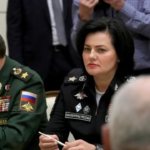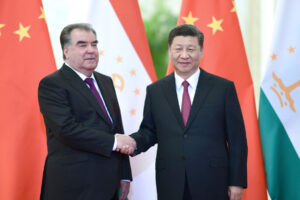TOKYO — Leaders from nearly 100 coast guards, including China’s, met in Japan’s capital this week on matters of international cooperation, even as their vessels bear the brunt of conflict and competition.
This year’s Coast Guard Global Summit was the largest ever, with 88 countries and eight other organizations gathered Tuesday and Wednesday at Hotel New Otani. Previous summits took place in 2017 and 2019.
A variety of topics were discussed, including new technology like unmanned vessels, climate change, environmental resources and information sharing, according to Rear Adm. Brendan McPherson, deputy commander of U.S. Coast Guard-Pacific Area.
“The focus here was bringing coast guards together who have shared interests,” he told Stars and Stripes at the summit’s conclusion. “A good example of that is search and rescue, saving lives. Regardless of the differences in challenges that we all face — and those are real — there are areas where there is opportunity for coordination, cooperation or even just communication.”

Not on the agenda were ongoing conflicts between China, which sent representatives to the summit, and neighboring countries like the Philippines and Japan, whose coast guards are squaring off over contested territorial claims in the East China and South China seas.
Japan’s coast guard on Wednesday once again intercepted Chinese coast guard vessels near the Senkaku Islands in the East China Sea. The Senkakus, relative specks of dry land between Taiwan and Okinawa, are administered by Japan also but claimed by China and Taiwan.
China and the Philippines are at odds over conflicting claims in the South China Sea, particularly Second Thomas Shoal in the Spratly Islands. The Chinese and Filipino summit contingents sat nearly opposite each other in the hotel’s banquet room.
The Philippines has grounded a World War II-era transport ship at the shoal as a manned outpost that China’s coast guard has attempted to blockade.
Most recently, Chinese coast guard vessels on Oct. 22 collided with Filipino coast guard and supply vessels attempting to reach the outpost less than 150 nautical miles from Palawan, Philippines. It was the latest in a series of incidents there.
China’s claims in the Spratlys also conflict with other claimants — Vietnam and Malaysia — whose representatives also attended the summit. A representative for Taiwan, another claimant, was not present.
Discussions over territorial conflicts were not on the official agenda, Japan coast guard Commandant Shohei Ishii said at a Wednesday news conference after the summit.
“Countries may have various political issues but I think it is extremely important to continue to have a place for discussions to cooperate, encompassing these differences,” he said.
Ishii declined to elaborate on his discussions with other participants, but said he exchanged opinions during the meetings and receptions. He also declined to comment on whether issues between China and other countries were discussed.
Specific issues between nations may have been addressed in private during the summit, according to Benoit Hardy-Chartrand, an adjunct professor at Temple University’s Japan campus.
“Given the presence of coast guard leaders from these countries, it wouldn’t be surprising if they held meetings on the sidelines of the summit,” he told Stars and Stripes by email Thursday. “We have to recognize the limitations of potential bilateral meetings, however.”
Private discussions took place “in the margins around the formal presentations,” McPherson said after the summit, but he said he didn’t engage with the Philippines or China outside of the scheduled meetings.
“There’s a lot of engagement — bilateral, multilateral engagement — where the nations’ coast guards are creating opportunities either in person or virtually to work together,” he said.
Source : StarAndStripes
















